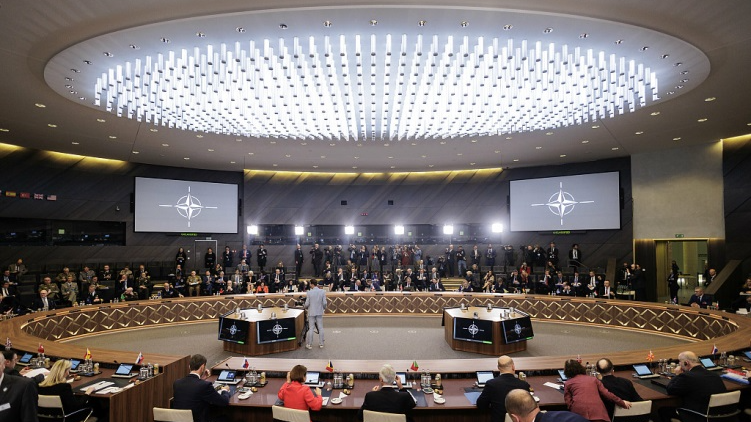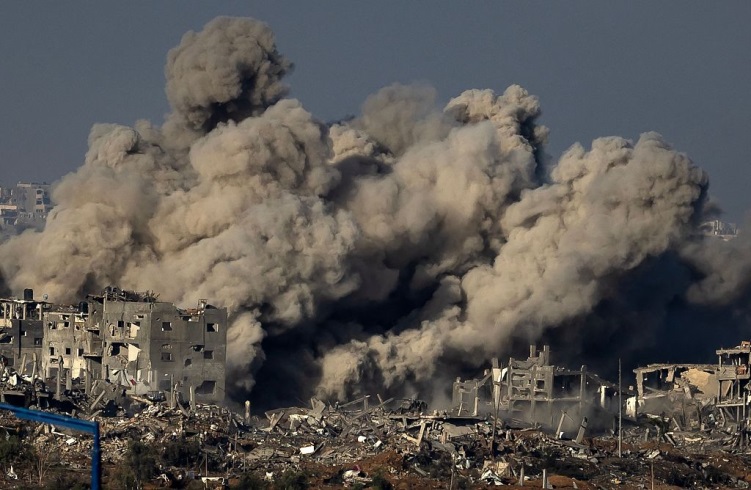
NATO foreign ministers' meeting is held at NATO headquarters in Brussels, capital of Belgium, November 28, 2023. /CFP
NATO foreign ministers' meeting is held at NATO headquarters in Brussels, capital of Belgium, November 28, 2023. /CFP
Editor's note: Dong Yifan, a special commentator on current affairs for CGTN, is a research fellow with the Institute of European Studies, at the China Institutes of Contemporary International Relations. The article reflects the author's opinions and not necessarily the views of CGTN.
On November 28-29, NATO is holding a meeting of foreign ministers in Brussels, where its headquarters is located. The meeting is chaired by NATO Secretary General Jens Stoltenberg. Public opinion generally believes that this meeting will focus on encouraging various member states to strengthen military support for Ukraine and help Ukraine gain battlefield advantages over Russia. The meeting will also involve agendas in other fields.
However, under the current geopolitical situation, NATO countries have inconsistent concerns over security, diplomacy and other fields, due to NATO's continued expansion and force deterrence to strengthen its role, which has been increasingly questioned.
Before this foreign ministers' meeting, the issue of greatest concern to all parties was whether Türkiye could complete its domestic legal procedures on Sweden's membership of NATO. The turmoil ended with the Turkish Parliament's Foreign Affairs Committee delaying a vote on the membership bid on November 16.
In fact, Türkiye's actions reflect the many internal contradictions and differences in the security field among NATO countries. Türkiye believes that Sweden harbors or even protects terrorist organizations that threaten Türkiye. Other Western countries, including Sweden, pointed out that Türkiye 's obstruction of Sweden's membership in NATO would weaken the unity and strength of the organization and essentially reflects the differences in the positions of various countries on counter-terrorism and non-traditional security issues.
At the same time, there are currently large differences in positions among NATO countries on Europe's security priorities. From the perspective of Poland and the Baltic countries, NATO needs to focus more on responding to the security challenges posed by Russia and further support Ukraine. However, the conflict between Israel and Hamas and the serious humanitarian disaster in Gaza have made Europe face an influx of refugees and immigrants, and has even stoked far-right, anti-Semitic and Islamic terror activities in Europe.
As the core of NATO, the United States not only did not try to defuse conflict in Ukraine and Gaza, on the contrary it dispatched aircraft carrier formations to the eastern Mediterranean near Israel and provided military assistance to Israel to escalate the situation, which threatens Europe's doorstep.

Smoke rises during an Israeli military bombardment of the northern Gaza Strip, November 15, 2023. /CFP
Smoke rises during an Israeli military bombardment of the northern Gaza Strip, November 15, 2023. /CFP
In addition, NATO countries have contrasting concerns about African security issues. France is wary of political and security turbulence caused by regime changes in west Africa, while the United States is pushing coup authorities in Niger back into power, evidenced by a senior U.S. diplomat visiting the African country in August. On the issue of NATO's expansion towards Asia, its member states are even more divided. Although many European countries have hoped to play a greater role in Asia in recent years and have formulated the EU-Indo Pacific Strategy, Europe itself is at risk of being involved in more conflicts. As a result some European countries do not want NATO to consume more resources and attention by getting entangled in the Asia-Pacific. Instead, they prefer NATO to focus on Europe's own security affairs.
For the United States, NATO is a tool to tie European allies to its global strategy. NATO's development in Asia-Pacific can serve its geopolitical strategic layout and even strengthen its strategic encirclement of China. However, European countries maintain a sober attitude towards this. As French President Emmanuel Macron once pointed out, Europe should not become a "vassal" of the U.S., and they should avoid getting involved in extraterritorial conflicts, which could cause greater losses.
From a historical perspective, NATO's military operations and geographical expansion will bring more security challenges and geopolitical conflicts. This runs counter to the desire of European countries to enhance their own security and maintain a peaceful environment. It also makes NATO more internally divided, which led to confrontation within the bloc.
Currently, NATO is not only trying to expand in eastern and northern Europe, but is also trying to intervene in disputes in the Western Balkans. This is also likely to intensify potential conflicts.
It is worth noting that some NATO countries have already made some new attempts to seek peace. For example, North Macedonia recently expressed its willingness to temporarily relax aviation sanctions against Russia so that Russia can send a delegation to participate in the peace conference held in the country. Hungary and Slovakia have also opposed further supply of weapons to Ukraine.
Therefore, NATO should consider how best to achieve its original intention of achieving peace and security in Europe, rather than constantly expanding to prove its global clout while bringing more security problems to Europe and the world.
(If you want to contribute and have specific expertise, please contact us at opinions@cgtn.com. Follow @thouse_opinions on Twitter to discover the latest commentaries in the CGTN Opinion Section.)



